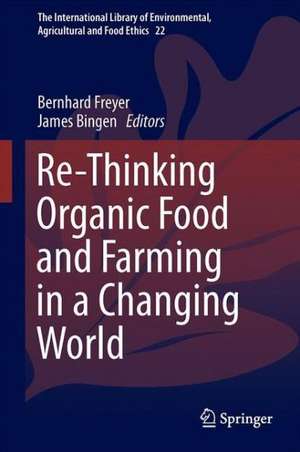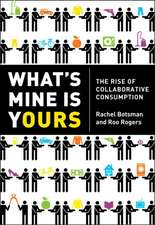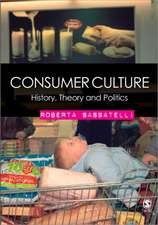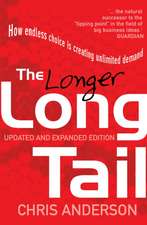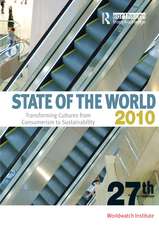Re-Thinking Organic Food and Farming in a Changing World: The International Library of Environmental, Agricultural and Food Ethics, cartea 22
Editat de Bernhard Freyer, Jim Bingenen Limba Engleză Hardback – 3 noi 2014
| Toate formatele și edițiile | Preț | Express |
|---|---|---|
| Paperback (1) | 391.40 lei 6-8 săpt. | |
| SPRINGER NETHERLANDS – 11 sep 2016 | 391.40 lei 6-8 săpt. | |
| Hardback (1) | 398.74 lei 6-8 săpt. | |
| SPRINGER NETHERLANDS – 3 noi 2014 | 398.74 lei 6-8 săpt. |
Din seria The International Library of Environmental, Agricultural and Food Ethics
- 15%
 Preț: 707.96 lei
Preț: 707.96 lei -
 Preț: 451.76 lei
Preț: 451.76 lei - 18%
 Preț: 731.10 lei
Preț: 731.10 lei - 18%
 Preț: 744.53 lei
Preț: 744.53 lei - 18%
 Preț: 899.87 lei
Preț: 899.87 lei - 18%
 Preț: 1831.27 lei
Preț: 1831.27 lei - 15%
 Preț: 644.82 lei
Preț: 644.82 lei - 15%
 Preț: 643.16 lei
Preț: 643.16 lei - 18%
 Preț: 947.04 lei
Preț: 947.04 lei - 18%
 Preț: 953.20 lei
Preț: 953.20 lei - 15%
 Preț: 646.62 lei
Preț: 646.62 lei - 15%
 Preț: 646.75 lei
Preț: 646.75 lei - 18%
 Preț: 1116.40 lei
Preț: 1116.40 lei - 15%
 Preț: 643.99 lei
Preț: 643.99 lei - 18%
 Preț: 953.65 lei
Preț: 953.65 lei - 15%
 Preț: 645.28 lei
Preț: 645.28 lei - 15%
 Preț: 637.28 lei
Preț: 637.28 lei - 18%
 Preț: 786.66 lei
Preț: 786.66 lei - 15%
 Preț: 644.30 lei
Preț: 644.30 lei - 18%
 Preț: 902.69 lei
Preț: 902.69 lei - 24%
 Preț: 697.63 lei
Preț: 697.63 lei -
 Preț: 388.52 lei
Preț: 388.52 lei - 20%
 Preț: 570.97 lei
Preț: 570.97 lei - 18%
 Preț: 784.61 lei
Preț: 784.61 lei - 15%
 Preț: 527.79 lei
Preț: 527.79 lei - 24%
 Preț: 635.50 lei
Preț: 635.50 lei - 15%
 Preț: 647.08 lei
Preț: 647.08 lei
Preț: 398.74 lei
Nou
Puncte Express: 598
Preț estimativ în valută:
76.30€ • 79.93$ • 63.24£
76.30€ • 79.93$ • 63.24£
Carte tipărită la comandă
Livrare economică 08-22 aprilie
Preluare comenzi: 021 569.72.76
Specificații
ISBN-13: 9789401791892
ISBN-10: 9401791899
Pagini: 352
Ilustrații: XXII, 329 p. 4 illus., 3 illus. in color.
Dimensiuni: 155 x 235 x 28 mm
Greutate: 0.67 kg
Ediția:2015
Editura: SPRINGER NETHERLANDS
Colecția Springer
Seria The International Library of Environmental, Agricultural and Food Ethics
Locul publicării:Dordrecht, Netherlands
ISBN-10: 9401791899
Pagini: 352
Ilustrații: XXII, 329 p. 4 illus., 3 illus. in color.
Dimensiuni: 155 x 235 x 28 mm
Greutate: 0.67 kg
Ediția:2015
Editura: SPRINGER NETHERLANDS
Colecția Springer
Seria The International Library of Environmental, Agricultural and Food Ethics
Locul publicării:Dordrecht, Netherlands
Public țintă
ResearchCuprins
List of Figures and Tables.- Acknowledgements.- List of Contributors.- List of Acronyms and Abbreviations.- Part I Foundations.- Introduction.- Ethics in the Organic Movement.- Part II Standards and Certifications.- Overview and observations.- Organic Certification and the Rationalization of Alternative Food and Agriculture: Sustainable Shrimp Farming in Indonesia.- Differentiating Organics: Performing Multiple Objects to Organize Singular Markets for Organic Tea and Biscuits in the UK.- Feeding the World – The Contribution of IFOAM Principles.- Part III Markets and Consumers.- Overview and observations.- Who Came First? The Egg or the Carton? An Analysis of Organic Packaging for Italian Retail Chain Esselunga.- Increasing Demand for Pasture-Based Dairy: What Attributes and Images Do Consumers Want?.- Post-National Organic: Globalization and the Field of Organic Food in Israel.- Part IV The Interplay of Conventional and Organic.- Overview and observations.- Engaging the Organic Conventionalization Debate.- Organic Farmers: Contributing to the Resilience of the Food System?.- From The Ground Up? The Principles of Australian Organic Agriculture.- Amish Dedication to Farming and Adoption of Organic Dairy Systems.- Part V Framework for Re-thinking Ethics in the Organic Movement.- Ethics in the Organic Movement: Current Role and Future Perspectives.- Positioning Organic Ethics.- Index.
Textul de pe ultima copertă
This book is based on the assumption that “organic has lost its way”. Paradoxically, it comes at a time when we witness the continuing of growth in organic food production and markets around the world. Yet, the book claims that organic has lost sight of its first or fundamental philosophical principles and ontological assumptions. The collection offers empirically grounded discussions that address the principles and fundamental assumptions of organic farming and marketing practices. The book draws attention to the core principles of organic and offers different clearly articulated and well-defined conceptual frameworks that offer new insights into organic practices. Divided into five parts, the book presents new perspectives on enduring issues, examines standards and certification, gives insights into much-discussed and additional market and consumer issues, and reviews the interplay of organic and conventional farming. The book concludes with a framework for rethinking ethics in the organic movement and reflections on the positioning of organic ethics.
Caracteristici
Offers new perspectives on enduring issues related to organic food and farming Provides insight into organic issues in a broad range of countries from Europe, North America, Africa, New Zealand and Asia (Indonesia/Japan) and Australia. Covers a wide range of social science issues related organic food and farming? Includes supplementary material: sn.pub/extras
